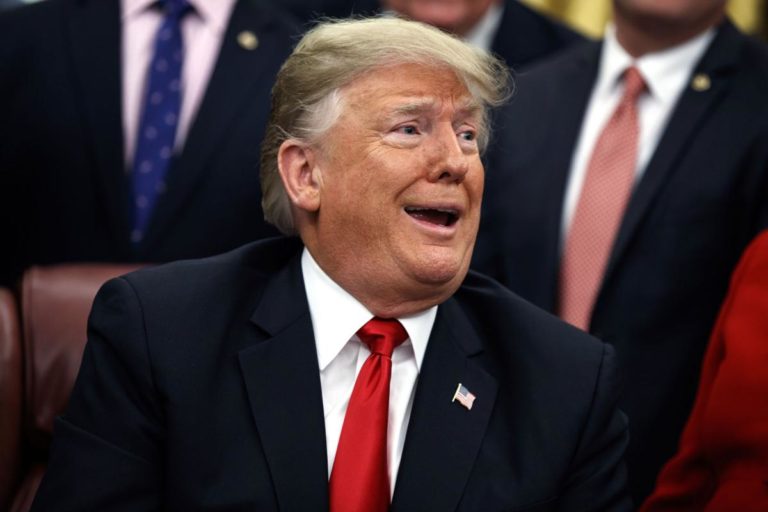President Donald Trump’s relationship with the Republican Party, always a marriage of convenience, is showing signs of serious strain.
The president threatened his bond with virtually every GOP constituency this past week.
His move to withdraw troops from Syria led to the resignation of Defense Secretary Jim Mattis and left Washington’s Republican foreign policy establishment aghast, drawing unusual criticism from Senate Majority Leader Mitch McConnell, R-Ky., and Sen. Lindsey Graham, R-S.C., normally a Trump ally.
Trump’s initial openness to a government funding bill that didn’t include money for his much-heralded border wall with Mexico infuriated conservatives, including the talk radio and cable television personalities who often shower the president with praise. By pushing the government into a partial shutdown with no clear strategy out, Trump frustrated the rest of his party, which was hoping for a holiday break from Trump-driven dramas.
The divergent plotlines had a common theme: Trump’s rejection of his party’s counsel as he looks once again to rely on his own instincts to guide his political future.
The whirlwind week seemed to foreshadow what probably will be a rocky two years ahead as Trump, a businessman-turned-politician, gears up for re-election by putting his political interests ahead of those of his adoptive party. Trump is ending the year with his political vulnerabilities exposed, unwilling or unable to forge consensus and catering to a narrow base that he hopes will recreate his improbable 2016 election victory.
“This is tyranny of talk radio hosts,” said retiring Sen. Bob Corker, a Tennessee Republican and frequent Trump critic who skipped a White House meeting Friday on the spending impasse. “You have two talk radio hosts who completely flipped a president.”
In an attempt to shift blame for the shutdown, the outsider president who ran on a slogan of “drain the swamp” embraced the tactic employed of so many of his predecessors: positioning himself in contrast to the far-less-favorably viewed Congress. He vented publicly and privately at lawmakers for failing to get him the border wall money even as they noted he barely registered an opinion on the legislation until the 11th hour.
“I think he had thought he would be able to accept this,” said Sen. Mike Rounds, R-S.D. “But I think once he saw the reaction from the base, it strengthened his resolve to move forward. Unfortunately that puts us in this position we’ve got right now.”
Trump’s decision to withdrawal American forces from Syria and his contemplated drawdown in Afghanistan should hardly come as a surprise to Republicans who saw him promise those moves during the campaign. Still, that doesn’t lessen the sting.
Trump’s isolationist foreign policy broke with decades of mainstream GOP thinking, and the departure of Mattis and a U.S. envoy to the global coalition fighting the Islamic State proved that Trump’s instincts are now the guiding ideology of his administration.
Though some in the GOP can barely contain their anger with the president, Republicans are hardly defecting from Trump, who is still wildly popular with primary voters. To that point, Republicans in the House rallied Thursday to pass a bill that included money for the border wall.
Amid persistent speculation that another Republican may try to challenge Trump in 2020, the party is considering ways to protect him.
Some Republicans in New Hampshire, for example, pressed for a rules change that would drop the state party’s traditional neutrality in primaries. GOP leaders in South Carolina have debated scrapping their primary altogether, which would deny a challenger the chance to collect early delegates who would otherwise go to Trump.
The president is taking a gamble with his go-it-alone approach.
He risks damaging relationships with Republicans in Congress days before Democrats are set to regain control of the House and are poised to pursue multiple investigations into Trump’s personal and professional conduct. Trump’s ties with GOP lawmakers will be especially important if Democrats pursue impeachment.
Perhaps more importantly, it’s not clear his moves will resonate with voters, especially the suburban women who turned out in droves in the November midterm elections to back Democrats. A Quinnipiac University poll this month found that 62 percent of registered voters overall said they were opposed to shutting down the government over differences on funding the border wall, though 59 percent of Republicans said they were in favor.
According to AP VoteCast, a nationwide survey of more than 115,000 midterm voters conducted for The Associated Press by NORC at the University of Chicago, more midterm voters opposed building a wall along the U.S.-Mexico border than favored it, 53 percent to 47 percent.
Overall, 82 percent of Republican voters expressed support for the wall, while nearly as many Democrats, 86 percent, said they were opposed. Also, nearly 6 in 10 independents (59 percent) also expressed opposition.
(AP)












4 Responses
If the Democrats move towards a socialist-oriented candidate, there would be an opening for a “third party” supporting free trade, liberal immigration, balanced budget , pro-business policies and a strong national defense. To win it would have to be a fusion of moderates from both parties (someone like Joe Lieberman, or Kennedy or Johnson from the Democrats, someone ideologically similar to Reagan or Bush for the Republicans).
However dumping Trump wold be worthless since without Trump’s “deplorables” the Republicans would not be able to compete nationally.
Even the degenerate lying adulterer disagrees with himself on the wall. It’s no longer necessary to be a big beautiful solid wall, it can now be slats, and it has to be paid for by us instead of Mexico. An incompetent dumbbell.
Do AP writers have otherwise meaningful lives , other than churning out and excreting hourly 24/7 anti -Trump clogged drain water?
A blind monkey could probably do a better job than the degenerate lying adulterer.